人教版八下英语Unit2全单元教案
人教版初中八年级英语下册第二单元Unit 2 教案含教学反思
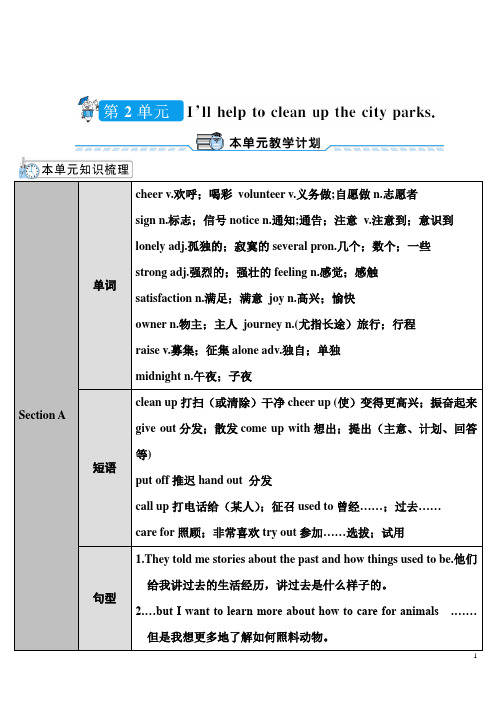
Section A 单词cheer v.欢呼;喝彩volunteer v.义务做;自愿做n.志愿者sign n.标志;信号notice n.通知;通告;注意v.注意到;意识到lonely adj.孤独的;寂寞的several pron.几个;数个;一些strong adj.强烈的;强壮的feeling n.感觉;感触satisfaction n.满足;满意joy n.髙兴;愉快owner n.物主;主人journey n.(尤指长途)旅行;行程raise v.募集;征集alone adv.独自;单独midnight n.午夜;子夜短语clean up打扫(或清除)干净cheer up (使)变得更高兴;振奋起来give out分发;散发come up with想出;提出(主意、计划、回答等)put off推迟hand out 分发call up打电话给(某人);征召used to曾经……;过去……care for照顾;非常喜欢try out参加……选拔;试用句型1.They told me stories about the past and how things used to be.他们给我讲过去的生活经历,讲过去是什么样子的。
2.…but I want to learn more about how to care for animals.……但是我想更多地了解如何照料动物。
句型1.I’m sure you know that this group was set up to help disabled people like me.我确定你知道这个团体是为了帮助像我这样的残疾人而建立的。
2.You helped to make it possible for me to have Lucky.有了你的帮助,我才有可能拥有“幸运儿”。
3.I’ll send you a photo of him if you like,and I could show you how he helps me.如果你喜欢,我会把它的一张照片寄给你,并可以让你看看它是怎样帮助我的。
人教版八年级英语下册 Unit 2 Section A 3a-4c 教案
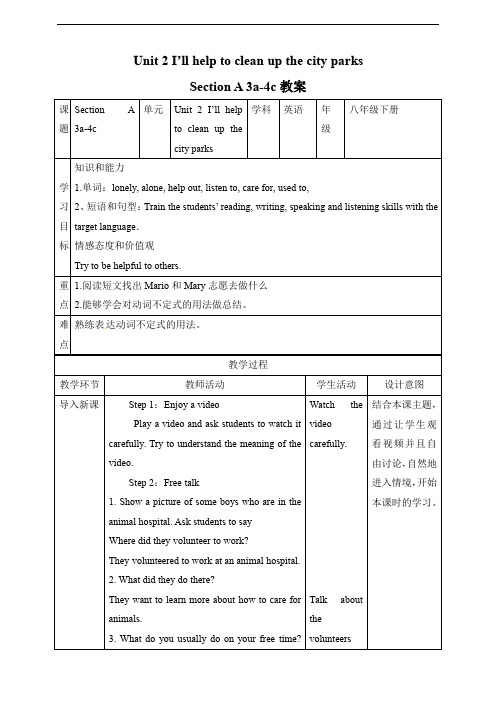
Unit2I’ll help to clean up the city parks Section A3a-4c教案课题Section A3a-4c单元Unit2I’ll helpto clean up thecity parks学科英语年级八年级下册学习目标知识和能力1.单词:lonely,alone,help out,listen to,care for,used to,2、短语和句型:Train the students’reading,writing,speaking and listening skills with the target language.情感态度和价值观Try to be helpful to others.重点1.阅读短文找出Mario和Mary志愿去做什么2.能够学会对动词不定式的用法做总结。
难点熟练表达动词不定式的用法。
教学过程教学环节教师活动学生活动设计意图导入新课Step1:Enjoy a videoPlay a video and ask students to watch it carefully.Try to understand the meaning of thevideo.Step2:Free talk1.Show a picture of some boys who are in theanimal hospital.Ask students to sayWhere did they volunteer to work?They volunteered to work at an animal hospital.2.What did they do there?They want to learn more about how to care foranimals.3.What do you usually do on your free time?Watch thevideocarefully.Talk aboutthevolunteers结合本课主题,通过让学生观看视频并且自由讨论,自然地进入情境,开始本课时的学习。
八年级英语下册全册教案人教版新目标

Unit 1 Will people have robots ?单元教学目标:1、Words&phrases: robot, paper, less, fewer, simple, unpleasant, factory, seem, etc .2、will 构成的一般将来时态的陈述句、否定句、疑问句及回答.3、There be 句型的一般将来时.4、more , less , fewer 的用法.5、学习一般将来时态的相关知识,学会对未来进行预测.单元重难点:1、will构成一般将来时态的句式。
2、There be 句型的一般将来时态。
3、more , fewer , less 的用法。
4、How to make predictions .第一课时课前准备:教师:录音机、所学物品的图片。
学生:英语点金教练、练习本及相关的学习用具教学步骤:Step 1 Leading in(导入话题,激活背景知识)(导入话题,激活背景知识)1.Greetings: Welcome to school .What’s the date today ? Who’s o n duty today ?Do you enjoy your winter holiday ?(你喜欢你的寒假吗?)Do you finish your Homework(家庭作业)?(你完成你的假期作业了吗?)Do you want to live on the moon ?(你想去月球吗?)Can you guess what will happen in ten years ?(你能猜出十年后将会发生什么吗?)Collect the Ss’ answers and say somethi ng about their predictions .Step 2 Pre-task(任务前活动)SB Page 2 ,1a .1.Look at the picture :How will the world be different in the future ,100 years from now ?We’re going to talk about sth in 100 years .2.Read each predictions to the class .Explain the new vocabulary .3.Read the instructions .Make sure Ss know what they should do .4.Do it by themselves .5.Talk about the answers with the class .Explain :一般将来时态构成: will / be going to +动词原形=Step 3 While-task(任务中活动)SB Page 2 ,1b .1.Practise reading the six predictions .2.Read the instructions to Ss .Circle the things you hear on the recording .3.Play the tape twice .(放录音,两次)4.Play the tape a third time .At the same time ,check the answers .SB Page 2 , 1c .1、Pay attention to the dialogues .2、Read the dialogues fluently .3、Pairwork .Work in pairs to make predictions according to the sample .4、Ask several pairs to share their conversations to the class .SB Page 3 , 2a & 2b .1、Read the predictions .2、Read the instructions and point out the sample answer .3、Play the tape twice .Ss circle the word they hear in each sentences: more , less , fewer .4、Check the answers .学生探究: less , fewer 的区别。
2020年春人教新目标英语八年级下册Unit2-全单元教案
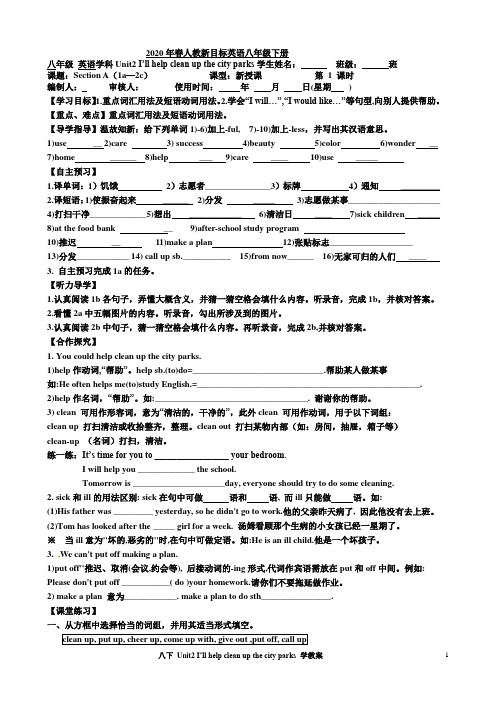
2020年春人教新目标英语八年级下册八年级英语学科Unit2 I’ll help clean up the city parks学生姓名:班级:班课题:Section A(1a—2c)课型:新授课第1 课时编制人:审核人:使用时间:年月日(星期)【学习目标】1.重点词汇用法及短语动词用法。
2.学会“I will…”,“I would like…”等句型,向别人提供帮助。
【重点、难点】重点词汇用法及短语动词用法。
【导学指导】温故知新:给下列单词1)-6)加上-ful, 7)-10)加上-less,并写出其汉语意思。
1)use __ 2)care 3) success 4)beauty 5)color 6)wonder __ 7)home ______ 8)help ___ 9)care ____ 10)use _____【自主预习】1.译单词:1)饥饿2)志愿者_______________3)标牌4)通知_________2.译短语:1)使振奋起来______ 2)分发_____ 3)志愿做某事_____________________ 4)打扫干净_____________5)想出____________ 6)清洁日____ 7)sick children _____ 8)at the food bank __ 9)after-school study program10)推迟__ 11)make a plan 12)张贴标志___________________13)分发____________ 14) call up sb.___________ 15)from now______ 16)无家可归的人们____ 3. 自主预习完成1a的任务。
【听力导学】1.认真阅读1b各句子,弄懂大概含义,并猜一猜空格会填什么内容。
听录音,完成1b,并核对答案。
2.看懂2a中五幅图片的内容。
听录音,勾出所涉及到的图片。
人教版八年级英语下册第二单元教案
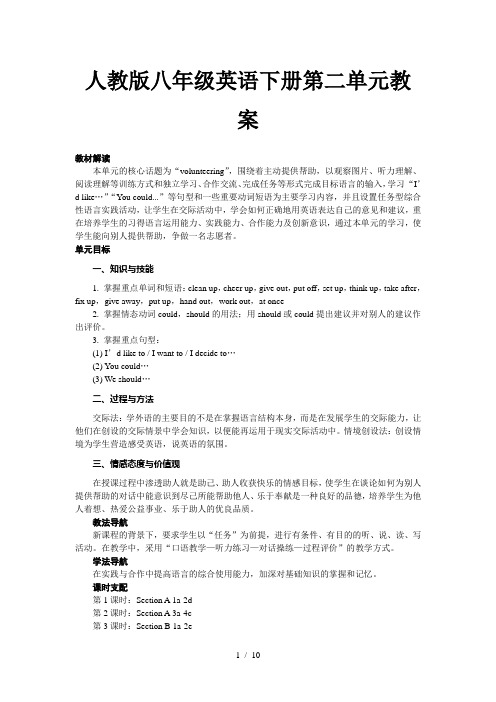
人教版八年级英语下册第二单元教案教材解读本单元的核心话题为“volunteering”,围绕着主动提供帮助,以观察图片、听力理解、阅读理解等训练方式和独立学习、合作交流、完成任务等形式完成目标语言的输入,学习“I’d like…”“You could...”等句型和一些重要动词短语为主要学习内容,并且设置任务型综合性语言实践活动,让学生在交际活动中,学会如何正确地用英语表达自己的意见和建议,重在培养学生的习得语言运用能力、实践能力、合作能力及创新意识,通过本单元的学习,使学生能向别人提供帮助,争做一名志愿者。
单元目标一、知识与技能1. 掌握重点单词和短语:clean up,cheer up,give out,put off,set up,think up,take after,fix up,give away,put up,hand out,work out,at once2. 掌握情态动词could,should的用法;用should或could提出建议并对别人的建议作出评价。
3. 掌握重点句型:(1) I’d like to / I want to / I decide to…(2) You could…(3) We should…二、过程与方法交际法:学外语的主要目的不是在掌握语言结构本身,而是在发展学生的交际能力,让他们在创设的交际情景中学会知识,以便能再运用于现实交际活动中。
情境创设法:创设情境为学生营造感受英语,说英语的氛围。
三、情感态度与价值观在授课过程中渗透助人就是助己、助人收获快乐的情感目标,使学生在谈论如何为别人提供帮助的对话中能意识到尽己所能帮助他人、乐于奉献是一种良好的品德,培养学生为他人着想、热爱公益事业、乐于助人的优良品质。
教法导航新课程的背景下,要求学生以“任务”为前提,进行有条件、有目的的听、说、读、写活动。
在教学中,采用“口语教学—听力练习—对话操练—过程评价”的教学方式。
2020年春人教新目标英语八年级下册Unit2全单元教案(无答案)
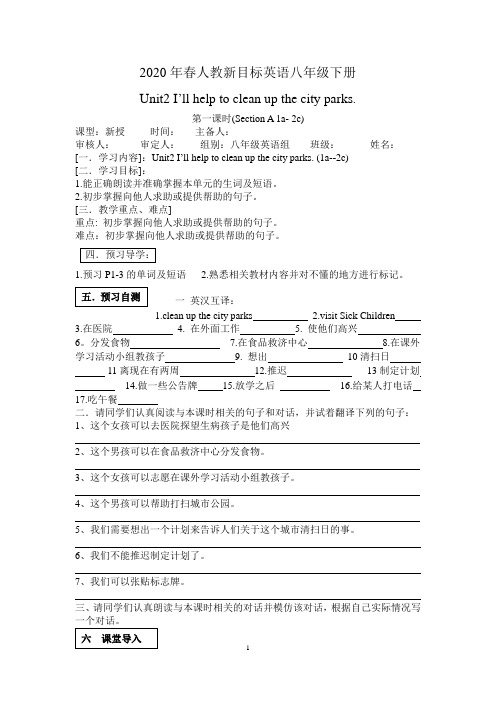
2020年春人教新目标英语八年级下册Unit2 I’ll help to clean up the city parks.第一课时(Section A 1a- 2c)课型:新授时间:主备人:审核人:审定人:组别:八年级英语组班级:姓名:[一.学习内容]:Unit2 I’ll help to clean up the city parks. (1a--2c)[二.学习目标]:1.能正确朗读并准确掌握本单元的生词及短语。
2.初步掌握向他人求助或提供帮助的句子。
[三.教学重点、难点]重点: 初步掌握向他人求助或提供帮助的句子。
难点:初步掌握向他人求助或提供帮助的句子。
1.预习P1-3的单词及短语2.熟悉相关教材内容并对不懂的地方进行标记。
一英汉互译:1.clean up the city parks2.visit Sick Children3.在医院4. 在外面工作5. 使他们高兴6。
分发食物7.在食品救济中心_____8.在课外学习活动小组教孩子9. 想出10清扫日______ 11离现在有两周_____12.推迟13制定计划__ ____ 14.做一些公告牌15.放学之后16.给某人打电话17.吃午餐二.请同学们认真阅读与本课时相关的句子和对话,并试着翻译下列的句子:1、这个女孩可以去医院探望生病孩子是他们高兴2、这个男孩可以在食品救济中心分发食物。
3、这个女孩可以志愿在课外学习活动小组教孩子。
4、这个男孩可以帮助打扫城市公园。
5、我们需要想出一个计划来告诉人们关于这个城市清扫日的事。
6、我们不能推迟制定计划了。
7、我们可以张贴标志牌。
三、请同学们认真朗读与本课时相关的对话并模仿该对话,根据自己实际情况写一个对话。
让学生小组回忆以前所学的有关于委婉(一)教学步骤1. 解读学习目标,学习新词汇2.教师通过玩游戏”Touch your ---”,然后引出询问向他人求助或提供帮助的句子:A: I like reading books.What could you do? B:You could volunteerin an after-school study program to teach kids. (选出写的好的小组进行加分)并核查预习案3.给学生5分钟的时间,让他们模仿1a中的短语进行相互问答练习并把他们编的对话写下来,听听力完成1 b,然后进行相互问答练习。
人教版八年级下册英语教案(全册)
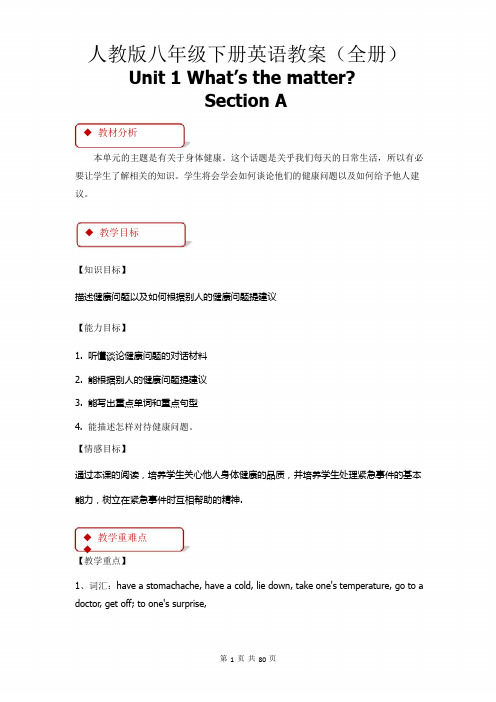
人教版八年级下册英语教案(全册)Unit1What’s the matter?Section A◆教材分析本单元的主题是有关于身体健康。
这个话题是关乎我们每天的日常生活,所以有必要让学生了解相关的知识。
学生将会学会如何谈论他们的健康问题以及如何给予他人建议。
◆教学目标【知识目标】描述健康问题以及如何根据别人的健康问题提建议【能力目标】1.听懂谈论健康问题的对话材料2.能根据别人的健康问题提建议3.能写出重点单词和重点句型4.能描述怎样对待健康问题。
【情感目标】通过本课的阅读,培养学生关心他人身体健康的品质,并培养学生处理紧急事件的基本能力,树立在紧急事件时互相帮助的精神.◆教学重难点◆【教学重点】1、词汇:have a stomachache,have a cold,lie down,take one's temperature,go to a doctor,get off;to one's surprise,2、句型:1.——What's the matter?——I have a stomachache.You shouldn't eat so much next time.2.——What's the matter with Ben?——He hurt himself.He has a sore back.——He should lie down and rest.【教学难点】掌握情态动词should shouldn't.的用法;学习have的用法◆课前准备◆Multimedia,group work,cooperative discussion.◆教学过程Step1.Warm up1.Look at the picture and learn the parts of the body.2.New words and phrases.Step2Presentation1.1aLook at the picture.Write the correct letter[a-m]for each part of the body.Then check the answers.2.1bFirst,lead Ss to read the five names.Then look at the picture.Number the names1-5.’sFinally, check the answers.3. 1cDivide two Ss into a pair to make conversations. Finally, invite several pairs to act outfor the class.Step 3 Practice1. 2aTell Ss there are five conversations. In each conversation the person says what goingon with them. Listen carefully and number the pictures.Play the tape. Then check the answers.2. 2bAsk Ss to listen to the recording again to match the problems with the advice.Play the recording again. Then check the answers.3. 2cAsk Ss to make conversations using the information in 2a and2b. Give them enoughtime to do this task. Later , invite several pairs to present their conversations to theclass.Step 4 Consolidation1. 2dFirst, ask Ss to have a fast reading of the conversation to get the main idea.Then, lead Ss to read the conversation sentence by sentence, explain some languagepoints.Finally, divide Ss into pairs to practice role-playing the conversation.2. 3aFirst, read the passage quickly and answer the question.Then,lead Ss to read the passage and analyse the key points.Finally,read together.3.3bRead the passage again and check the things that happened in the story3cDiscuss the questions with a partner.4.Grammar focusFirst,lead Ss to read the sentences.Then,prompt Ss to analyse the use of model verb should.After that,explain the grammar together.5.4aAsk Ss to fill in the blanks.Then,invite some Ss to present their answers.6.4bAsk Ss to circle the best advice for these health problems,then add their own advice.After that,invite some Ss to present their advice.7.4cOne student mimes a problem.The other students in your group guess the problem and give advice.Step5Language pointsStep6HomeworkMake a conversation about health problems and giving advice.Unit1What’s the matter?Section B◆教材分析本单元的主题是有关于身体健康。
【人教版】八年级英语上册 Unit 2 全单元英文教案

Unit 2How often do you exercise?本单元的教学内容围绕“多久做一次运动”这一话题展开。
Section A是基本语言内容的收集和学习,这一部分引导学生通过本课的语言素材进行看图说话、句型演练、实际描述,通过对话表演等使学生能够正确地使用表示做什么活动的词组,多久做一次的句型,从而熟练地谈论多久做一次活动。
Section B是知识的扩展和语言的综合运用,是在Section A的基础上,锻炼学生能够自如地谈论自己的生活习惯。
这些内容都是与学生日常生活紧密相关的,学生很熟悉,也乐于去说,因此在这一课题的教学过程中,应紧密联系学生生活实际,采用多种方式,以说为主,配合听的练习,最终以对话为途径,解决本课题的中心语句。
这易于引发学生学会运用简单的英语进行交际和交流,也对提高学生的综合能力,特别是说的能力很有帮助。
学生通过对本单元的学习,可以引导他们养成良好的生活习惯和饮食习惯,从而合理安排自己的各项工作,享受丰富多彩的校园生活。
第一课时Section A(1a-2d)Teaching Goals【教学目标】Key words:housework,hardly,ever,once,twice,Internet,program,full,swingKey phrases:how often,on weekends,go to the movies,help with housework,hardly ever,go shopping,once/twice a week/a month,swing danceKey sentences:1.What do you usually do on weekends?I often go to the movies.2.How often do you watch TV?I watch TV every day.Teaching Key Points【教学重点】The vocabulary:housework,hardly,ever,once,twice,how often,on weekends,go to the movies,go shopping,help with housework,once/twice/three times a week/a month Target language:What do you usually do on weekends?I often go to the movies. Does he go shopping?No,he never goes shopping. How often do you have piano lessons?Twice a week,on Wednesday and Friday.Teaching Difficult Points【教学难点】1.The adverbs of frequency:always,usually,often,sometimes,hardly ever,never2.Target language above.Teaching Aids【教学工具】An English textbook,a tape recorder,CAI or courseware.Teaching Steps【教学过程】★Step 1Leading in1.Greetings:Talk about something the students did on summer vacation.2.Check the homework.★Step 2Pre-taskPage 9,1a.1.Look at the picture.2.Name each activity.T:What are they doing?S:They are shopping/reading/exercising/watching TV/helping with housework.(Help the students to answer.)3.Write the activities on the line.4.Check the answers on the board.5.Practice reading.Page 9,1c.1.Focus on the conversation in the box.2.Practice reading.3.Pair-work:What do you do on weekends?I...4.Group-work:Divide the class into groups of four or five. Make conversations. First S1 to S2:S1:What do you do on weekends?S2:I...S1:What does she/he do on weekends?S2:She/He...5.Act out their own dialogues.★Step 3While-taskPage 9,1b.1.Look at each picture above 1a.Tell what the person does on weekends. Check the Ss orally.2.Make sure what they will hear and do.3.Read these adverbs and explain.4.Play the tape twice. Write the letters on the line.Page 10,2a & 2b.1.Read the activities and the answers of “how often” first.2.Practice reading.3.In 2a we should know the activities you hear. In 2b we should know the answers of how often he does the activities.4.Play the tape for the first time. Ss only listen.5.Play the tape a second time. Ss do 2a.6.Play the tape a third time. Check the answers.7.Play the tape. Ss do 2b.8.Check the answers.In this part,we should pay attention to “how often”cause of special questions and answers.★Step 4Post-taskPage 10,2c & 2d.1.Focus on the conversation in 2c first.2.Practice reading.3.Read the activities in the left box.4.Fill in the chart.5.Pair-work:Make conversations.6.Make students scan the conversation in 2d.7.Teach and then make Ss role-play the conversation in pairs. In this part,student A will be Jack. Student B will be Claire. As they talk,move around to monitortheir work. Offer language or pronunciation support as needed.8.Have a group of students present their conversation to the class.★Step 5Homework1.Practice the conversation in 2d.2.Do the exercises on Page 8 in students' book.Board Design板书设计Unit 2How often do you exercise?The first period Section A(1a-2d)1.Key vocabulary:housework,once,twice,full,how often,on weekends,go to the movies,help with housework,hardly ever,once a week,three times a month 2.表示动作的频率由高到低依次是always(100%),usually(80%),often(30%~50%),sometimes(20%),hardly ever(5%),never(0%)。
【人教版】八年级英语上册 Unit 2 全单元英文教案

Unit 2 How often do you exercise?Language Goal 【语言目标】Talk about how often you do things:in this unit,students learn to talk about what things they do and how often they do these things.Knowledge Goals 【知识目标】Key Wordshousework,hardly,ever,once twice,full,maybe,least,junk,coffee,health,percent,online,although,through,mind,body,such,together,die,writer,dentist,magazine,however,than,almost,less,pointKey Phraseshow often,on weekends,go to the movies,hardlyever,twice a week,three times a week,be goodfor,at least,such as,less than,more than Key Sentences1. How often do you exercise?2.What do you usually do on weekends?Key Grammar1. The use of adverbs of frequency.2.“How often” cause of special questions andanswers.Ability Goals 【能力目标】1. Through the learning to gain the ability to talk about how often people do things.2.Write a report about how often people do things.Moral Goals 【情感目标】1. Keep a diary every day.2.Do more exercise and develop good habits to keep healthy.Teaching Time 【课时】Five periodsPeriod 1 Section A(1a-2d)Period 2 Section A(Grammar Focus-3c)Period 3 Section B(1a-1e)Period 4 Section B (2a-2e)Period 5 Section B (3a-Self Check)本单元的教学内容围绕“多久做一次运动”这一话题展开。
人教版八年级英语下册Unit2全单元教案
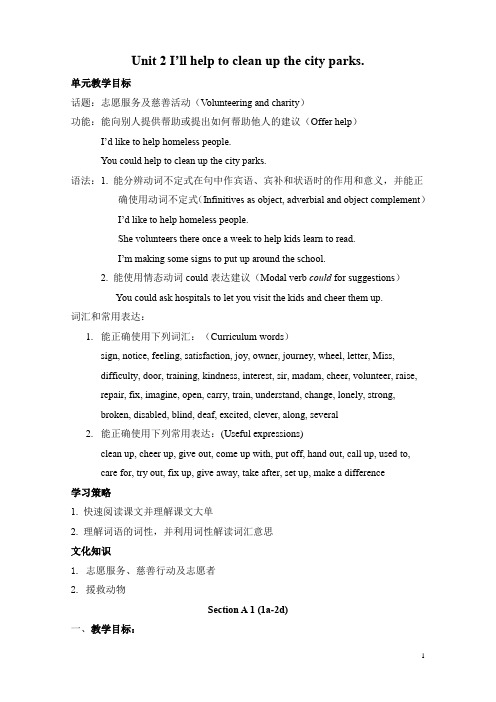
Unit 2 I’ll help to clean up the city parks.单元教学目标话题:志愿服务及慈善活动(V olunteering and charity)功能:能向别人提供帮助或提出如何帮助他人的建议(Offer help)I’d like to help homeless people.You could help to clean up the city parks.语法:1. 能分辨动词不定式在句中作宾语、宾补和状语时的作用和意义,并能正确使用动词不定式(Infinitives as object, adverbial and object complement)I’d like to help homeless people.She volunteers there once a week to help kids learn to read.I’m making some signs to put up around the school.2. 能使用情态动词could表达建议(Modal verb could for suggestions)You could ask hospitals to let you visit the kids and cheer them up.词汇和常用表达:1.能正确使用下列词汇:(Curriculum words)sign, notice, feeling, satisfaction, joy, owner, journey, wheel, letter, Miss,difficulty, door, training, kindness, interest, sir, madam, cheer, volunteer, raise,repair, fix, imagine, open, carry, train, understand, change, lonely, strong,broken, disabled, blind, deaf, excited, clever, along, several2.能正确使用下列常用表达:(Useful expressions)clean up, cheer up, give out, come up with, put off, hand out, call up, used to,care for, try out, fix up, give away, take after, set up, make a difference学习策略1. 快速阅读课文并理解课文大单2. 理解词语的词性,并利用词性解读词汇意思文化知识1.志愿服务、慈善行动及志愿者2.援救动物Section A 1 (1a-2d)一、教学目标:1. 1) 能掌握以下单词:clean up, cheer, cheer up, give out, volunteer, come up with,put off, sign, notice, hand out, call up, used to, lonely, carefor能掌握以下句型:You could help to clean up the city parks.You could give out food at a food bank.The girl could visit the sick kids in the hospital to cheer them up.The girl could volunteer in an after-school study program to teach kids.We need to come up with a plan to tell people about the city park clean-up.We should listen to them and care for them.2) 能了解以下语法:情态动词could, should的用法;用should或could提出建议并对别人的建议作出评价。
人教版新目标八年级英语第2单元Unit2教案
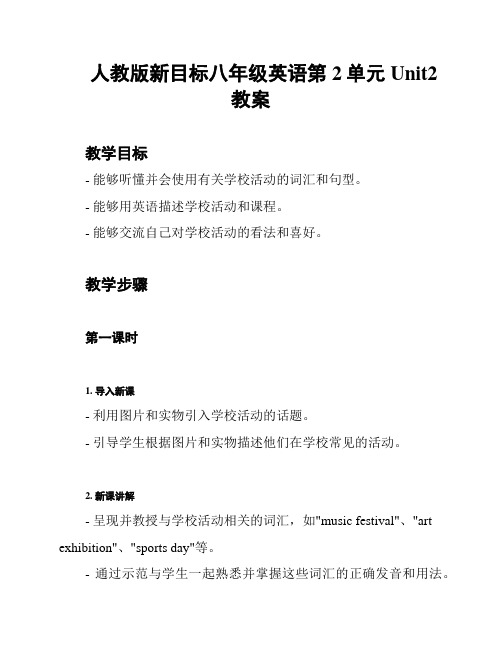
人教版新目标八年级英语第2单元Unit2教案教学目标- 能够听懂并会使用有关学校活动的词汇和句型。
- 能够用英语描述学校活动和课程。
- 能够交流自己对学校活动的看法和喜好。
教学步骤第一课时1. 导入新课- 利用图片和实物引入学校活动的话题。
- 引导学生根据图片和实物描述他们在学校常见的活动。
2. 新课讲解- 呈现并教授与学校活动相关的词汇,如"music festival"、"art exhibition"、"sports day"等。
- 通过示范与学生一起熟悉并掌握这些词汇的正确发音和用法。
- 操练这些词汇,并与学生一起编制句子来描述学校活动。
3. 听力训练- 播放关于学校活动的对话,要求学生仔细听并选择正确的图片。
- 学生互相对话,讨论听到的对话内容。
4. 对话练- 分组或两人一组,让学生模仿对话,表演关于学校活动的场景。
- 鼓励学生用英语进行自由对话,并互相分享自己参与过的学校活动。
5. 作业布置- 课堂分发作业卷,要求学生写一篇短文,介绍自己最喜欢的学校活动,并陈述原因。
第二课时1. 短文分享- 学生轮流与同桌分享自己写的短文。
- 鼓励其他学生提出问题或表达对短文的意见和建议。
2. 阅读训练- 学生阅读一篇关于学校活动的短文,并回答相关问题。
- 教师引导学生理解短文的内容,帮助他们解决阅读中遇到的问题。
3. 语法讲解- 教授句子结构"What do you think of + 学校活动?"和相应的答语。
- 帮助学生理解并掌握这种句子结构的用法。
4. 语法练- 学生分组或两人一组,互相提问"What do you think of + 学校活动?"并回答对方。
- 引导学生用所学词汇和句型互相交流和讨论自己对学校活动的看法和喜好。
5. 总结课堂内容- 教师带领学生回顾本节课所学的词汇、句型和语法。
人教版八年级英语下unit2ppt课件

4. With no one to talk to. He _f_e_e_ls_ very _l_o_n_e_ly_ ( 感觉很孤独).
5. The life _u_s_e_d_ _t_o_ _b_e_ (曾经是) very interesting in my school days.
18
to be
I__c_o_u_ld__h_e_lp__t_h_e_o_l_d____________ __p_e_o_p_l_e_c_r_o_s_s_t_h_e_s_t_re_e_t_. _.
I_c_o_u_ld__s_e_n_d_b__o_o_k_s_t_o_t_h_e_p_o_o_r____ __st_u_d_e_n_t_s_______________.
listen to them and care for them.
Helen: You’re right. I mean, we’re all going to be old
one day, too.
12
1. They told me stories about the past and how things used to be. used to do sth. 过去常常做某事; 表示 过去习惯性、经常性的动作或状态, 暗指现在已经不存在。used无人称和 时态的变化。
Imagine you are a bird, what will you do? Though there are difficulties ,we still work har It is normal to feel like this.
He needs much training to be a good player. Thanks for your kindness.
译林版八年级下册英语unit2 travelling公开课全套单元教案设计(191页)
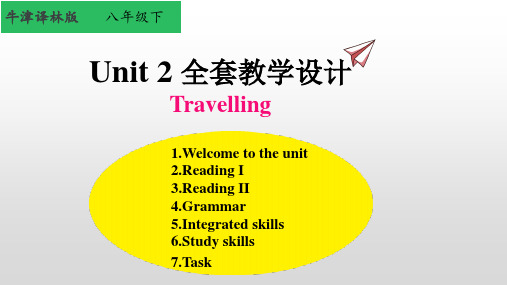
B Daniel and Millie are talking about
the places in Part A. Work in pairs
and talk to your partner about
different places. Use the
conversation below as a model.
Do you know any famous tourist attractions in Yancheng?
The New Fourth Army Memorial
Yancheng Nature Reserve Milu Deer Nature Reserve
1. Is Eddie happy in the first picture? Why? Yes. Because he is going on a trip.
Kitty is visiting Hong Kong during the winter holiday. She has written a letter to Millie about Hong Kong Disneyland. Here is the letter. Listen and read the letter and answer the questions.
(A:)What’s this, Millie?
()
()
B: It’s the Little Mermaid.
A: Where is it?
B: It’s in Copenhagen, the capital of Denmark.
A: What’s special about it? B: It comes from the story by Hans Christian
人教版初中八年级英语下册第二单元Unit 2 教案含教学反思

Section A 单词cheer v.欢呼;喝彩volunteer v.义务做;自愿做n.志愿者sign n.标志;信号notice n.通知;通告;注意v.注意到;意识到lonely adj.孤独的;寂寞的several pron.几个;数个;一些strong adj.强烈的;强壮的feeling n.感觉;感触satisfaction n.满足;满意joy n.髙兴;愉快owner n.物主;主人journey n.(尤指长途)旅行;行程raise v.募集;征集alone adv.独自;单独midnight n.午夜;子夜短语clean up打扫(或清除)干净cheer up (使)变得更高兴;振奋起来give out分发;散发come up with想出;提出(主意、计划、回答等)put off推迟hand out 分发call up打电话给(某人);征召used to曾经……;过去……care for照顾;非常喜欢try out参加……选拔;试用句型1.They told me stories about the past and how things used to be.他们给我讲过去的生活经历,讲过去是什么样子的。
2.…but I want to learn more about how to care for animals.……但是我想更多地了解如何照料动物。
句型1.I’m sure you know that this group was set up to help disabled people like me.我确定你知道这个团体是为了帮助像我这样的残疾人而建立的。
2.You helped to make it possible for me to have Lucky.有了你的帮助,我才有可能拥有“幸运儿”。
3.I’ll send you a photo of him if you like,and I could show you how he helps me.如果你喜欢,我会把它的一张照片寄给你,并可以让你看看它是怎样帮助我的。
人教版八年级英语下册单元复习教案

回忆知识,复习语法
复习语法
.
学习知识,复习语
巩固所学知识
鼓励学生练习,使学生在不知不觉中将知识应用到实处。
对本单元的基本句型进行机械操练,使学生能够脱口而出。
巩固知识
个
性
化
教
学
为学有余力学生所做的调整
为需要帮助的学生所做调整
(3).用will/ shall do表示将来:主要意义,一是表示预见。You will feel better after taking this medicine. Do you think it will rain?二是表示意图. I will not lend the book to you. Take it easy,I will not do it any longer.基本结构:Shewill come to have class tomorrow. Will she come to have class tomorrow? She won’t come to have class tomorrow.What will she do tomorrow?
(1)·一般将来时·there will be
用be doing表示将来:主要意义是表示按计划、安排即将发生的动作,常用于位置转移的动词。如:go,come,leave,arrive等,也可用于其他动作动词。We are having fish for dinner. We are moving to a different hotel the day after tomorrow.这种用法通常带有表示将来的时间状语,如果不带时间状语,则根据上下文可表示最近即将发生的动作。A: Where are you going? B: I am going for a walk. Are you coming with me? A: Yes,I am just coming. Wait for me.
人教版(2023)英语必修第二册 Unit 2 Wildlife Protection 全单元教案

人教版(2023)英语必修第二册Unit 2 Wildlife Protection 全单元教案Unit 2 Wildlife ProtectionDiscovering Useful Structure【教材分析】The activity topic of this section is “report an ongoing event”, and the structure is the passive voice of present continuous tense. Rare wild animals are suffering from large-scale poaching, and species are on the brink of danger. Rescue operations are underway.“Being” and “suffering” are the meanings of the present progressive passive voice.The usage of present progressive passive voice is of great importance in writing a good discourse and appreciating some difficult language items, so it is vital to master it and use it flexibly in a context.【教学目标】1. Motivate students to deepen the understanding of the usage of present progressive passive voice in a fixed context.2. Enable students to master the usage of present progressive passive voice and use it flexibly in a context.3. Lead students to construct sentences or appreciate sentences used master it and use it flexibly in a context.【教学重难点】1. Help students to appreciate the function of the usage of present progressive passive voice in a sentence.2. Instruct students to write essays using the proper usage of present progressive passive voice.【教学过程】[课前诊断]Look at the picture and tell me what workers are doing. What is the house being doneThe workers are building a house.A house is being built by the workers.We’re being killed for the wool beneath our stomachs. And our fur is being used to make sweaters for people like you.We are being hunted for our ivories.Step 1: Read the sentences and sum up the meanings of the Present Continuous Passive Voice.1. Do you know any other endangered wildlife in China that is not being protected2. We’re being killed for the wool beneath our stomachs.3. Is their fur being used to make sweaters for people like you4. What good things are being done here to save local wildlife肯定式:be being doneShe is being treated in China now.否定式:be not being doneMy computer is being repaired now.我的电脑正在修理中。
人教版八年级下册第二单元Section B 1a—1e 教案

Section B 1 (1a-1e)一、教学目标:1. 语言知识目标:1) 能掌握以下单词:repair, fix, give away, wheel,broken,fix up,take after2) 能掌握以下句型:① I've run out of it.② I take after my mother.③ I fixed it up.④ I gave it away.2. 能力目标:通过学习、训练,掌握英语听力的基本解题方法。
2. 情感态度价值观目标:了解社会上有很多人需要我们的帮助,奉献爱心并不是要有多么伟大的壮举,而是首先自己要真正拥有一颗“爱心”,如此便可从身边的点点滴滴做起。
二、教学重难点1. 教学重点:1) 掌握本课时出现的生词及用法。
2) 进行听力训练,提高综合听说能力。
3)阅读短文,获得相关信息,提高学生们的综合阅读能力。
2. 教学难点1. 听力训练2. 阅读听力原稿的短文并完成相关要求。
三、教学用具课本,课件,图片,卡纸四、教学时间1课时(40分钟)五、教学过程Step 1 Warming up and revision1. Daily greeting.2. Watch a video and answer 3 questions① 1.Can you think out something to describe the boy in the video?② 2.Do you want to help others?③ I fixed it up.Step 2 Presentation1. Present the new words on the big screen and learn the new words together.1) repair v.修理;修补 2) fix v. 安装;使固定3) give away 赠送;捐赠 4) wheel n. 车轮;轮子5) broken adj.破损的 6)take after 长得像2. Ss read and try to remember the new words.3.GameT:Watch the pictures carefully.And tell me what word it describes.3. Work on 1a and match the sentences with the similar meaning. Ask one student read the phrases and the nouns. Tell Ss to match the phrasal verbs with the nouns. Then make sentences with the phrases.1. I’ve run out of it.2. I take after my mother.3. I fixed it up.4. I gave it away.a. I repaired it.b. I don’t have any more of it.c. I am similar to her.d. I didn’t keep it.Let some Ss come to the blackboard and write down their sentences. Then check together.3. Check their desk mates’ sentences.e.g. 1. I gave away my bike to a children’s home.2. I took after my father.3. I gave away my old clothes to the poor kid.4. I ran out of my money last weekend.5. I fix my bike and give it away.Step 3 Practice1.Introduction of a new friendT introduces a new friend to Ss.Tell Ss to look at the pictures in 1c. Tell them the boy in the pictures is Jimmy. He’s a good boy. He likes to help others. What is he doing now?2.Put the pictures in orderLet Ss work in pairs and ask them to put the pictures in order in their minds.3.Our story about JimmyDivide Ss in to groups of four.Then ask them to tell a story of Jimmy by using their own orders.Give Ss some time to do it.Finally , ask some groups to show their stories.4.Listen and numberPlay the recording for the Ss. Ss just listen for the first time. Play the recording again and number the pictures.Check the answers:5.Listen and chooseListen to the tape for a second time. And choose the phrases you hear.Play the tape.Check the answers.1.Jimmy (finds and buys; finds and sells) old bikes.2.Jimmy ( fixes up; cleans up) the bikes.3.Jimmy (puts away; gives away) the bikes to the kids.4.Jimmy (takes after;looks after) his father.5.Jimmy has (handed out; run out of) money.6.Work on 1d:1. Let Ss read the sentences in 1d first. Tell Ss to listen again and judge the sentences True or False.2. Play the recording again for the Ss to listen and judge.3. Ss listen to the recording carefully and try to judge. 3. Check the answers with the class.Step 4 Production1. Find the solutionsT:Even Jimmy is helpful,but he also has some problems. What is his problem?S:He runs out of money.T: Do you want to help him?Find some ways to help him.Let Ss work in groups and then speak out their problems.2. T: Show some pictures of disabled people , old people,sick people and their lives, for example, a blind man, some deaf girls. Tell Ss their life may be very difficult. They sometimes need our help.T:As a teenager, do we have enough money to help others?Ss:NoT:Here comes a good news.Next week, Queen Elizabeth will come to our school. She will give money to the group with the best idea. Do you want to get her money?Ss:Yes.T:Let’s work with our group members and think out the best ideas,Give Ss 1 min to do it with their group members.Finally, invite some groups to show their ideas.六.作业Walk around our campus,and find someone to help.Write a passage of 80 words about helping others.七.板书设计八.教学反思教学反思将于课后书写。
- 1、下载文档前请自行甄别文档内容的完整性,平台不提供额外的编辑、内容补充、找答案等附加服务。
- 2、"仅部分预览"的文档,不可在线预览部分如存在完整性等问题,可反馈申请退款(可完整预览的文档不适用该条件!)。
- 3、如文档侵犯您的权益,请联系客服反馈,我们会尽快为您处理(人工客服工作时间:9:00-18:30)。
1.This weekend the Association of Susong Volunteer is going to have a volunteering activity. Here are the four activities.And each group of you will take part in one of the activities. But what could
学情分析
班里还是有相当一部分学生,对英语缺乏学习兴趣,学习动力。通过开学两周对第一单元的学习,我曾试着有意提高这部分学生的课堂注意力及英语学习兴趣,成效不显著,本单元我会继续努力,在把握教学大纲的同时,也会把注意力更多地放在这部分学生身上, 努力让他们能够把英语成绩赶上来,把对英语学习热情找回来。
教
学
目
标
语言知识目标:能熟练掌握并运用下列词汇和短语:volunteer, cheer, cheer up, clean up, give out.能运用下列句型谈论向他人提供帮助及提出如何帮助他人的建议:I hope to…I want to… I’d like to …You could …语言技能目标:能听懂谈论提供帮助和提出如何帮助他人的建议;能看图预测听力内容;听时记录关键词语。能谈论如何帮助他人并向别人提出如何帮助他人的建议。学习策略目标:能通过与人合作,运用语言,习得语言。情感态度目标:培养学生乐于助人的志愿精神。
Greet the teacher.
Get ready for the new lesson
ห้องสมุดไป่ตู้教学
环节
教学活动
设计
意图
To arouse Ss’ imagination and help them love their hometown better.
Practice the listening
To help Ss to consolidate the phrases and sentences.
课前准备
教师
Teaching aid:PPT , multimedia
学生
Prepare some verbal phrases that they learned last term
教学活动过程设计(第1课时)
教学
环节
教学活动
设计
意图
教师活动
学生活动
Step1. Lead-in
1.Greet students.
2.While-listening
The first listening: number the pictures
The second listening: fill in the blanks
The third listening: Play a game to ask Ss to retell the conversations.
Play A’s sentence and stop the recording ,then ask the students to give A advice using “You could …” after that, compare it with the recording.
3.Post-listening
a.Pair work: practice conversations with your partners like this:
A:I want to …/I’d like to …/I hope to…
B: You could …
b.Ask some pairs to show their conversations.
八下英语第二单元教案(人教版)
Unit 2 I’ll help to clean up the 学科
英语
主备教师
复备教师
课题
Unit 2 I’ll help to clean up the city parks.SectionA
课型
New
教材分析
本单元主题涉及到援助与关爱(help and love),Section A 部分的教学重点是学习情态动词的could表达建议,正确使用有关援助的表述、短语动词以及相关表达中的动词不定时.学习难点是动词不定时的在英语句子中的成分与作用,以及不同动词短语的含义与搭配
教师活动
学生活动
Step2.Brainstom——What could we do to help others?
At school, what could we do?
Outside school, what could we do?
Step3.Listening practice(1b)
1.Pre-listening(look at the picture and predict the conversation)
2.Boys and girls, look at me, what am I ?(volunteer) Yes, I’m a volunteer (show the pictures about Volunteer) This weekend “I’ll help to clean up the city parks.” Do you want to be a volunteer like me?
Look at the picture in 1a and guess: What would the boy /the girl like to do? What could the boy/the girl do in today’s volunteer?
S:Maybe the boy/the girl would like to …The girl /The boy could …
教学重点难点分析
重点:学习用情态动词could表达建议及want/hope/would like to 表达帮助他人的想法。难点:掌握志愿服务的大量的相关词汇和表达。
教学策略分析
如何帮助他人并向别人提出如何帮助他人的建议.要求学生养成良好的听英语 的习惯,通过听力对话及时的巩固并记忆本节知识,之后在进行对话的产出,检 查学生对本节知识的掌握得到很好的反馈。在此之上,给学生展示一些有关环境 的图片,让学生在过程中进行情感培养和策略调整,以形成积极的学习态度, 促进自己语言实际的运用能力。
